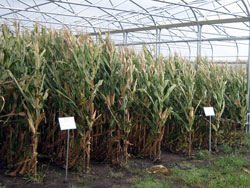 This picture is of Monsanto Yieldgard Plus corn at a stress plot in Iowa. It helps you visualize the following from their latest release. I like it when companies include images with their releases. A little audio never hurts either!
This picture is of Monsanto Yieldgard Plus corn at a stress plot in Iowa. It helps you visualize the following from their latest release. I like it when companies include images with their releases. A little audio never hurts either!
A moisture utilization study conducted by Monsanto this season has provided a unique look at how YieldGard® Plus Corn roots are able to effectively absorb subsoil moisture under dry conditions. The study involved placement of 60 moisture probes at five different locations across the Corn Belt to compare the root performance of YieldGard Plus plants with YieldGard Corn Borer hybrids protected by soil-applied insecticides. The probes, extending five feet underground, were in place from mid-June through September, providing data every 15 minutes on relative water density at different soil depths. Based on these readings during the growing season, root depth and water absorption could be monitored.
According to Clint Pilcher, Monsanto Corn Technology Development Manager, test results demonstrated that YieldGard Plus hybrids, with in-plant rootworm control, developed longer, healthier roots than soil insecticide-protected corn, which in turn resulted in significantly better moisture uptake. The Monsanto probes were part of a “stress mitigation” study during the 2006 season, demonstrating how YieldGard Plus is able to help reduce the stress of dry weather on corn plants. Most of the moisture probes were placed in Monsanto stress mitigation plots, which were grown under 40-foot by 50-foot tents with a clear vinyl top that allowed the corn plants to receive sunlight but not rain. Under these simulated dry conditions, YieldGard Plus corn hybrids achieved a 31.2 bushel-per-acre yield advantage over soil-insecticide protected corn.
Here’s another Monsanto story while I’m at it.
Early order patterns in the United States for Monsanto’s corn seeds and traits are reinforcing the company’s goals of growing market share and increasing trait penetration, particularly in a triple-stack combination. In the 2007 growing season, the company’s DEKALB and Asgrow national corn brands could have more than 35 percent of all of their seed sold in a triple stack, and for the first time will sell more acres of triple-stacked corn hybrids than hybrids with just one trait. The company’s American Seeds Inc. (ASI) subsidiary of regional seed brands could have more than 30 percent of its seed sold as a triple stack. In 2006, the mix of triple stacks was 21 percent for DEKALB and Asgrow, and the mix of triple stacks was 14 percent for ASI.
Monsanto’s triple-stack product in corn combines Roundup Ready herbicide tolerance, YieldGard Corn Borer insect protection and YieldGard Rootworm insect protection. In 2006, Monsanto’s triple-trait corn technology was planted on 5.8 million acres in the United States.
